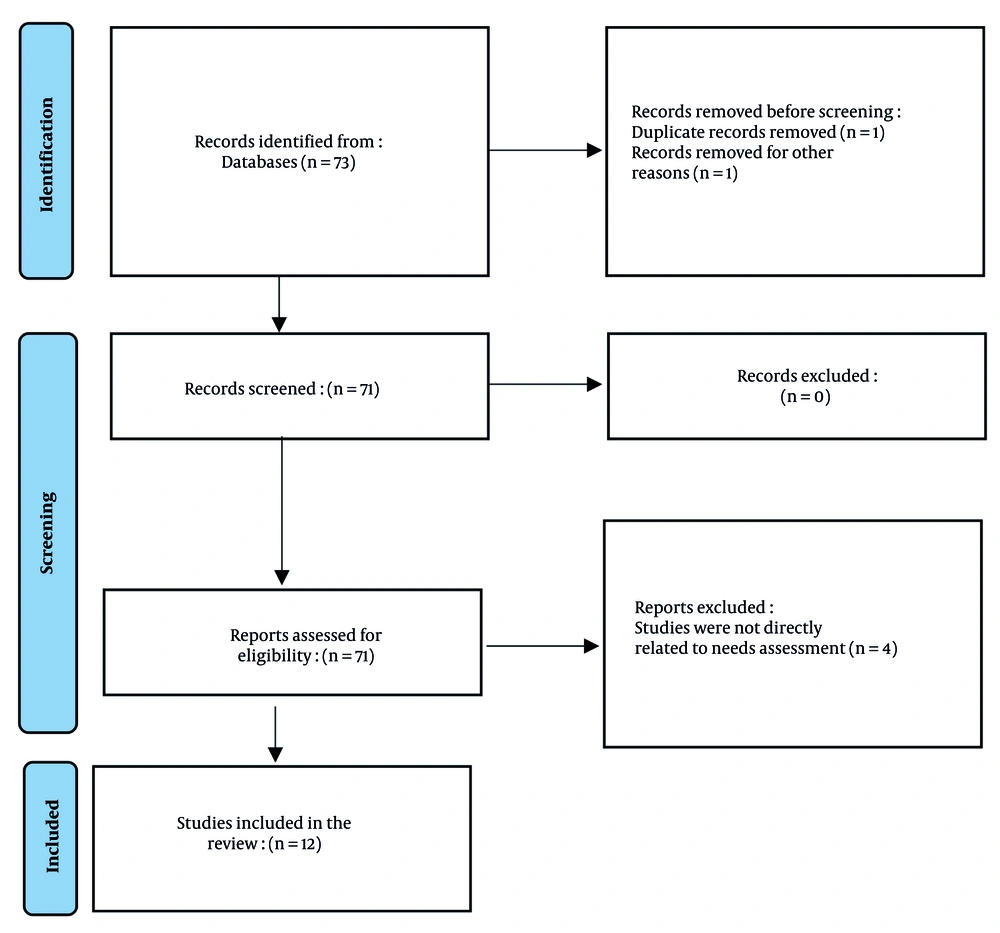1. Context
Empowering women through access to reproductive health services, including comprehensive education, is crucial for promoting individual and societal well-being (1). Health education plays a vital role in shaping women's understanding of reproductive health and influencing their health-related behaviors (2). Specifically, premarital education provides a valuable opportunity to address key reproductive health issues, promote healthy practices, and empower women to take control of their reproductive lives (3, 4).
The origins of various newborn health issues, such as infant mortality and genetic abnormalities, can often be traced back to the premarital and pre-pregnancy health of women. Consequently, reproductive health education for couples is of paramount importance in mitigating these adverse outcomes (5). Recognizing reproductive health as a universal human right emphasizes its importance in individual well-being and societal progress (6). Furthermore, investing in reproductive health education for young people is a crucial strategy for fostering healthy populations and contributing to national development (7).
Several key areas within reproductive health require educational attention such as sextually transmitted infections, sexual health, maternity care, and obstetric complications (8). Furthermore, many false expectations and beliefs surrounding fertility exist within society, which can negatively impact reproductive health outcomes. These misconceptions can be effectively addressed and corrected through premarital training classes focused on reproductive health, ultimately contributing to healthier families and a healthier nation (9).
The existence of a gap between the training provided and its desired quality, as mentioned in the literature, indicates that reviewing and adapting the educational content to the actual needs of couples is essential to increase the effectiveness of these classes and prepare couples for married life (10-12). Across many nations, despite efforts in reproductive health education and intervention, inadequate access to information and services continues to contribute to unintended pregnancies (13, 14). Women's reproductive health is directly linked to their level of education and training, highlighting the importance of understanding their needs for effective healthcare provision (15, 16).
Proper education can be a powerful tool for shaping values and goals related to reproductive health, emphasizing the need to consider its long-term impact (17-19). Given that demographic and socioeconomic factors also significantly influence women's reproductive well-being, a comprehensive understanding of the target population is crucial (20-23), (24-26). To this end, prioritizing and addressing key educational needs before marriage is essential. Research indicates that many couples experience reproductive health challenges, underscoring the urgency of these educational interventions (27, 28).
Since the implementation of mandatory premarital training in Iran in 1991, all prospective couples have been required to complete a designated course and provide a health certificate prior to marriage registration. This legal framework necessitates a thorough understanding of the specific needs and challenges faced by individuals preparing for marriage (29). A needs assessment is crucial for ensuring that these training programs are tailored to address these needs effectively. While numerous studies have explored the needs of couples regarding premarital education in Iran, a comprehensive synthesis of this research is lacking. This narrative review addresses this gap by examining studies published between 2007 and 2023. By synthesizing the findings, this review aims to identify the key needs of couples before marriage.
2. Evidence Acquisition
The present study has been carried out using a narrative review method to examine related articles in the field of educational needs assessment of pre-marital classes published between 2007 and 2023, by searching the databases of Jihad University (Sid), PubMed, Google Scolar and Irandoc. At first, using keywords "reproductive health, premarital education, Iran and needs assessment", 63 primary articles were extracted. Following the application of predefined inclusion and exclusion criteria, 12 studies met the eligibility requirements and were included in this review. Inclusion Criteria were studies conducted between 2007 and 2023 in Iran focusing on needs assessment related to premarital education programs and available in full text. Exclusion Criteria include studies were not directly related to needs assessment in premarital education, editorials, commentaries, and opinion pieces and studies with significant methodological flaws (Figure 1).
3. Results
The review of the conducted studies and the findings indicate that all assessed studies were conducted in a descriptive-cross-sectional manner (Table 1). Sample sizes ranged from a minimum of 22 to a maximum of 2117 people. The predominant data collection instrument was the questionnaire. However, Qazvinian's study in 2021 (30) employed interviews, while Karbasiun and Kalantari's study in 2014 (31) utilized a mixed-methods approach incorporating both questionnaires and interviews. The majority of the reviewed studies included female participants who were homemakers and male participants who were self-employed. The educational needs of urban and rural populations were found to be largely comparable in the majority of the studies conducted. While studies consistently showed above-average educational needs for both genders, women generally exhibited a higher level of need compared to men. While educational needs generally diminished with age for both men and women, employment status revealed a gender disparity: Employed women reported lower needs, whereas employed men reported higher needs. Based on the results of this review study, the educational topics needed in pre-marital classes were diverse and included areas such as: Marital and sexual health, prevention of common cancers in women, prevention of unwanted and high-risk pregnancies, congenital diseases, premarital tests, sexually transmitted diseases, and menstrual health. For other issues, key areas of focus were mental health, the qualifications of educators, the use of appropriate educational technology, and ensuring sufficient educational content. Table 1 shows the list of extracted studies.
| Authors | Article Title | Year | Sample Size | City | Tool | First Need | Second Need | Third Need | Fourth Need | Fifth Need |
|---|---|---|---|---|---|---|---|---|---|---|
| Qazvinian et al. (30) | Sexual health education needs assessment of newly married women in Qom Iran: A qualitative study | 2021 | 22 | Qom | Interview | Communication skills | Mutual understanding | Media literacy | Sexual awareness | Educational resources |
| Vazifemand et al. (32) | Premarital educational of couples referring to Taybad Health Center | 2020 | 382 | Taybad | Questionnaire | Spouse and family relationship | Fertility | Sexual relations | - | - |
| Bostani et al. (33) | Sexual health education priorities: Perspective from engaged couples in Rasht | 2017 | 840 | Rasht | Questionnaire | Qualified trainers | Appropriate educational environment | Appropriate technology | Sexual satisfaction and function | Sexually transmitted diseases |
| Rezabighi et al. (34) | Educational needs of counseling class in Health Center of Kerman | 2016 | 500 | Kerman | Questionnaire | Sexual health | Contraceptive methods | Relationship with husband and family | Methods of prevention and early detection of cancers | Congenital diseases |
| Karbasiun and Kalantari (31) | The determination of young couples educational needs in Yazd | 2014 | 480 | Yazd | Interview and questionnaire | Menstrual hygiene | Pregnancy | Sexually transmitted diseases | High risk pregnancy | Congenital diseases and cancer |
| Mohammadi et al. (35) | Couples education needs referred to Ershad and Fazel Health counters of Tehran for pre-marriage tests in 2014 | 2014 | 186 | Tehran | Questionnaire | Marital relations | Prevention of pregnancy | Marital relationship | Premarital tests | Sexual needs |
| Mokhtari Zanjani et al. (36) | Educational needs before marriage the point of view of couples referring to premarital counseling centers in Zanjan city | 2012 | 424 | Zanjan | Questionnaire | Fertility | Relationship with spouse | - | - | - |
| Khalegi Nejad et al. (37) | Investigating educational needs in premarital coupling classes | 2012 | 740 | Neyshabour | Questionnaire | Sexual hygiene | Prevention of common cancer | Congenital diseases | Family planning | Fertility |
| Shahhosseini et al. (38) | The effects of premarital relationship enrichment programs on marriage strength: A narrative review articleTehran | 2014 | 8 | Sari | Review | Communication skills | Self-awareness skill | Empathy skill | Problem solving skill & decision making skill | Self-assertiveness skill |
| Aghdak et al. (39) | Educational needs related to reproductive health in marriage candidates | 2009 | 2117 | Esfahan | Questionnaire | Prevention of common cancers | Sexual health | Unwanted high risk pregnancy | Premarital tests | Sexually transmitted diseases |
| Khalegi Nejad et al. (40) | Educational needs related to reproductive health in marriage candidates | 2008 | 446 | Mashhad | Questionnaire | Fertility | Family planning | Congenital diseases | Cancer | Sexual health |
| Pourmarzi et al. (41) | Comparative survey of youth’s sexual and reproductive health educational needs in two stages before and after marriage, Tehran 2011 | 2011 | 450 | Tehran | Questionnaire | Healthy sexual relationships | Pregnancy preparatiion | - | - | - |
4. Conclusions
This review synthesized existing literature to identify key needs among couples preparing for marriage, underscoring the necessity of comprehensive premarital education and support services. The identified needs encompassed a broad spectrum, ranging from interpersonal dynamics and psychological well-being to physical and sexual health, and family planning.
A recurring theme was the emphasis on mutual understanding between partners. This aligns with extensive research highlighting the critical role of effective communication, empathy, and shared values in successful long-term relationships (32, 42). Premarital education programs focusing on communication skills, conflict resolution strategies, and appreciating individual differences can significantly contribute to establishing a robust foundation for marital satisfaction and stability (43).
Psychological well-being emerged as another salient area. This finding underscores the importance of addressing emotional health and providing resources for couples to navigate the inherent stresses and transitions associated with marriage. Research suggests that premarital counseling interventions can effectively mitigate premarital anxiety, enhance relationship skills, and promote healthier relational dynamics (44). The desire for education on interpersonal dynamics, specifically communication with a spouse, further underscores the importance of relational skills in marriage. This resonates with research highlighting the strong association between effective communication patterns and marital satisfaction (38).
The expressed need for comprehensive education encompassed a wide range of topics, including reproductive health, family planning, and disease prevention. This emphasizes the importance of equipping women with accurate information and resources to make informed decisions regarding their health and fertility. Addressing sexually transmitted infections (STIs), including prevention, transmission, and available testing, is also crucial for promoting sexual health and preventing adverse health outcomes. It has been established that the prevention of STIs and common cancers affecting women are important for individuals preparing for marriage. However, current premarital education programs fail to adequately address these crucial topics (39).
The expressed interest in utilizing appropriate technology for educational purposes reflects the increasing integration of technology into healthcare and education delivery. The breadth of content in premarital education exceeds the available course time, creating a significant challenge. Addressing this requires a strategic approach, including extending the program over several months and integrating new technologies to maximize learning. This suggests that incorporating online resources, mobile health applications, and other technological tools into premarital education programs could enhance accessibility, engagement, and knowledge retention (45).
Further research is needed to explore deeper insights into the experiences and perspectives of couples regarding premarital education. More rigorous evaluation studies are needed to assess the effectiveness of existing premarital education programs in meeting the identified needs. Research should focus on developing culturally sensitive and evidence-based premarital education programs tailored to the specific needs of Iranian couples. Longitudinal studies are also needed to assess the long-term impact of premarital education on marital satisfaction and stability. Furthermore, the potential role of technology and online platforms in delivering premarital education programs should be investigated.
The review highlights the need for increased access to quality premarital education programs across Iran. The study emphasizes the importance of tailoring premarital education to address the specific needs of different populations. The findings can inform the development and improvement of premarital education programs.


